A Walking Practice for Wholeness and Connection
& Terraphilia Book Club discussion, part two
Hello, Friends,
I shot the short video above to share this place I call home. And as of an hour ago, I have an internet connection after ten days without, so sharing a video is possible again.
(The wind noise in the video is simply the out-breath of the high peaks at sunrise, when the cold air from above drains down-valley, flowing like water. As the day warms up, the flow reverses as the hot air rises. This landscape has lungs!)
Every morning after yoga and prayers, I walk a three-mile out-and-back route on the ditch road, climbing the steep hill above my neighborhood to the shelf that holds the ditch and striding its gentle grade, greeting the wildlings as I go.
That sunrise walk is my medicine. The time outside in the community of the land, both domestic and wild, practicing mindfulness as I greet my plant-kin, listen to birdsong and watch for deer and other animals, grounds and steadies me.
I walk, and my heart rate settles. My anxiety recedes, my alertness changes from fight-or-flight to relaxed awareness. I walk in the flow of the mountains breathing, and my own breaths deepen, my lungs expanding, my body taking in this place with each inhalation.
I walk, and I let my mind follow the sounds and sights and smells of this place. My attention turns outward instead of inward. My chattering-monkey mind quiets.
I walk myself into wholeness. Into connection with this land, this community, wild and human. Walking opens my mind, my heart, my body and my spirit. I walk into balance, harmony, beauty. I am grateful.
Walking in terraphilia, I walk into sacred time.
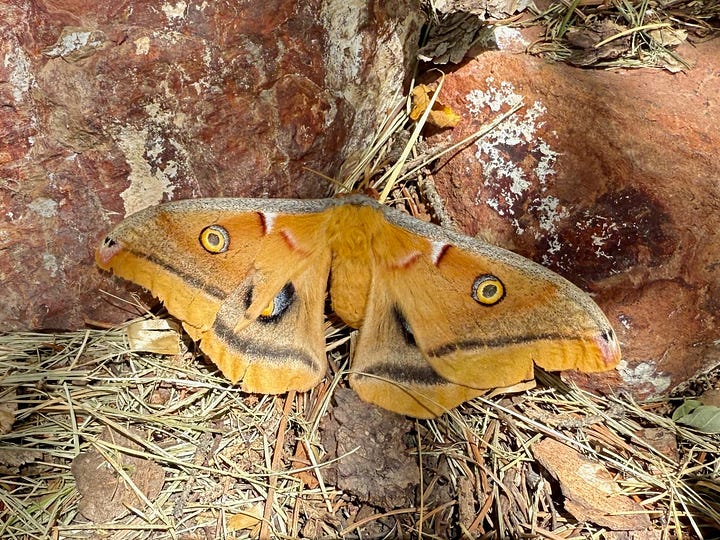
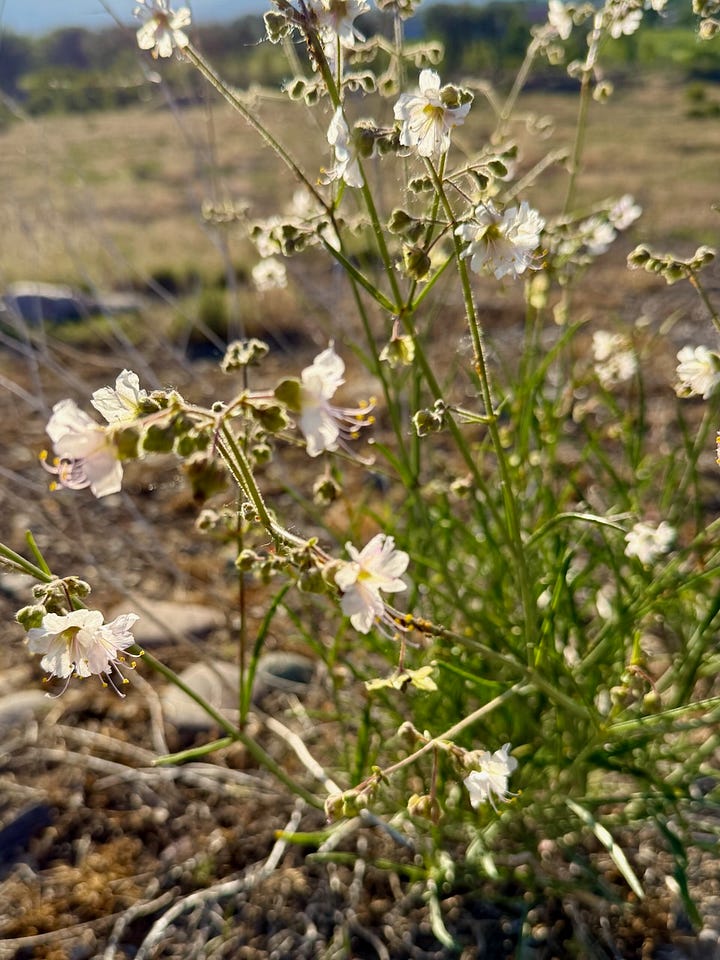
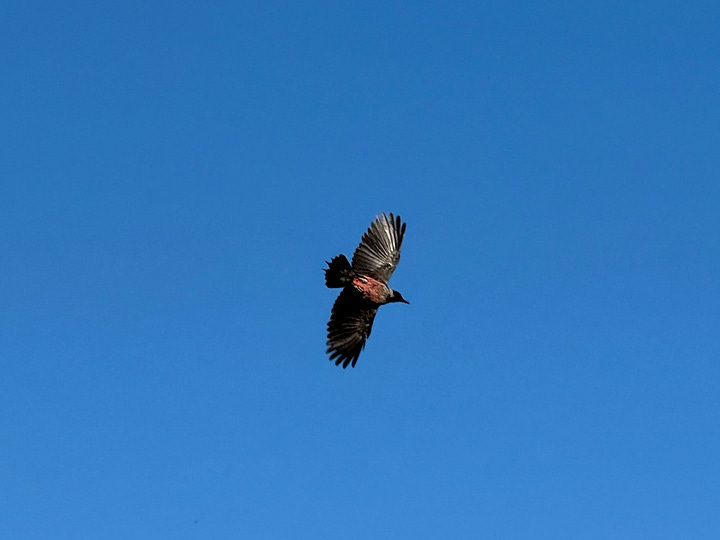
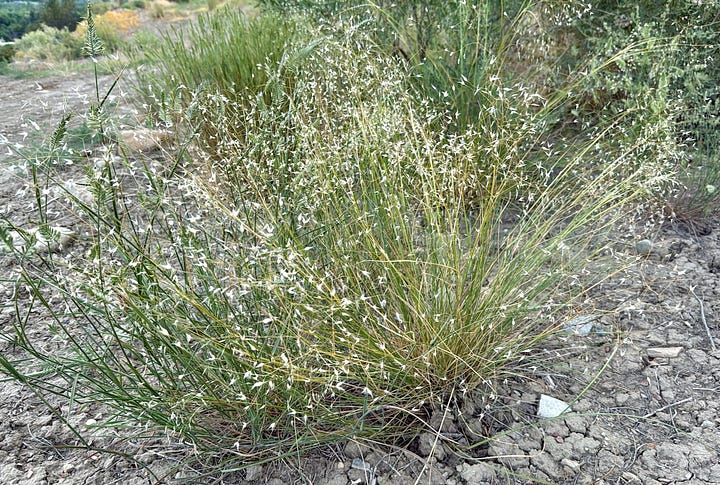
You too can walk your way to wholeness & connection
You don’t need to go far or fast. You simply need a place where you can walk without fear, breathe deeply and let go of stress. It doesn’t have to be wild or even semi-wild, though the greater diversity of more-than-human lives and the more natural smells, sights and sounds, the more healing.
Put away your phone, turn your watch and other devices to do not disturb. Take ten minutes to walk and listen to the world around you rather than the chatter in your head. Notice who shares the place, especially the wild ones. Stop to greet a pigeon, a clump of moss in a crack in the sidewalk, a lizard on a rock, a gull gliding the air.
Smell a flower. Admire a mushroom. Stroke a log or a rock. Listen to a bird and sing along. Watch a spider in her web or an ant foraging.
Let yourself be part of the wider, wilder world around you, and express your gratitude to the lives who animate and sustain that community.
If you can’t walk, sit somewhere that takes you out of the human world and into nature. Let yourself sink into the weft and weave of the lives around you. Thank them for their lives and their company.
Make this a daily practice. To paraphrase Mary Oliver: Pay attention. Be amazed. Let the world know you are grateful to be here, to belong.
Terraphilia Book Club discussion: Finding Beauty in a Broken World
Last month, I posed questions for discussion on Terry Tempest Williams’ book, Finding Beauty in a Broken World. My questions focused on the book’s unusual structure, the way it weaves three seemingly unrelated topics—mosaic-making, the lives of Utah prairie dogs, and Tempest Williams’ time in Rwanda witnessing the effects of the 1994 genocide, in which 1 million Tutsis where murdered in 100 days by the Hutu people.
Here are a couple of comments that came out of that discussion:
offered insight about the fragmented nature of the opening of the book:responded about how we handle violence in narratives:I've heard Christina Baldwin talk about a "contract with the reader." The idea behind that is that the beginning of a book lets people know what to expect. Here, they should get that the author won't use a very traditional way to tell a story. Also, that line, "Once upon a time, we knew the world from birth" is what Tempest Williams believes, I think, even though it’s [TS] Eliot's line. Even the use of "we" in Eliot's stanza helps her, I think. I believe she's using this to say that we all have some abandoned knowledge in common. … Everybody, including her, has lost something in the world.
My responses to harm and destruction can be highly emotional at times: I once stayed inside my house for two days, because a nearby forest of beautiful old trees was being clearcut. The mechanical buzzing of the efficient sawing and branch stripping machine, and then the thud of a massive Douglas firs falling to their death was simply too much for my nervous system. Reading the section on the murder of prairie dogs caused a similar response.
But we must witness this destruction to build our ethical and moral foundations of kinship behavior. So I read and wince. And I am thankful that my reaction is so visceral.
For this second part of the discussion, I want to focus on the section on Rwanda. (Spoiler alert: if you haven’t finished the book, you might want to stop here.) Tempest Williams’ account of her experiences there is heart-wrenching and also, I think, heart-opening. It’s where Tempest Williams meets Louis Gakumba, who will become her adopted adult son, challenging her understanding of herself, her marriage and her life-path.
Here are questions to consider and respond to:
On page 224 (in my paperback edition), Tempest Williams writes: “Rwanda. I didn’t want to come. I didn’t want to be in a place so familiar with Death. I had seen enough in my own family. I was also scared. The only thing I knew of Rwanda was genocide and the weight of that word.”
Notice first the structure of those sentences: broken, choppy, almost breathless. They show us her fear and her reluctance. They show us “broken” in a way that is intentionally disruptive and disturbing.
And then on page 238, “I came to Rwanda to step over my fears and found out for myself how a people who carry the history of genocide in their hearts not only begin to heal but to move forward in the name of forgiveness and acceptance. … It is August, 2005. Steve [her brother] has been dead seven months.”
Have you ever, like Tempest Williams, been afraid to do something but also been impelled by some force stronger than fear to do it anyway? How did that change your life?When Tempest Williams introduces Louis Gakumba, the group’s young interpreter on page 239, she describes him with a love that foreshadows the relationship to come, “He is twenty-one years old, elegant and poised. His eyes are almond-shaped and brown with long curled lashes. His skin is the deep hue of chestnuts. And when he smiles, we relax, believing joy can cohabit with hardship.”
For the next hundred-fifty pages, as Tempest Williams travels with the group charged with helping a Tutsi village find healing through art, Louis is a constant presence, a thread holding Tempest Williams and the narrative from breaking under the weight of despair.
Were you surprised when two years later, Louis’s biological parents entrust the son of their hearts to Terry and Brooke, a couple from a culture and world foreign to them, a couple who they have never met before? Did you see this turn in the story coming?On page 386, Tempest Williams writes, “I am coming to understand that saying yes to Louis is about engagement, a reconfiguration of everything I have known. He has become a safe harbor I could not have imagined. What I didn’t know is that I would need him much more than he needs me.”
And this, “Finding beauty in a broken world becomes … the work of daring contemplation that inspires action.”
When you read these passages at the end of the book you feel Tempest Williams’ fear and also hope? Do you think that Louis choosing Terry and her husband Brooke Williams as his “parents in America” was Tempest Williams’ personal “finding beauty in a broken world?”
Leave a comment to join the discussion!
Blessings, Susan



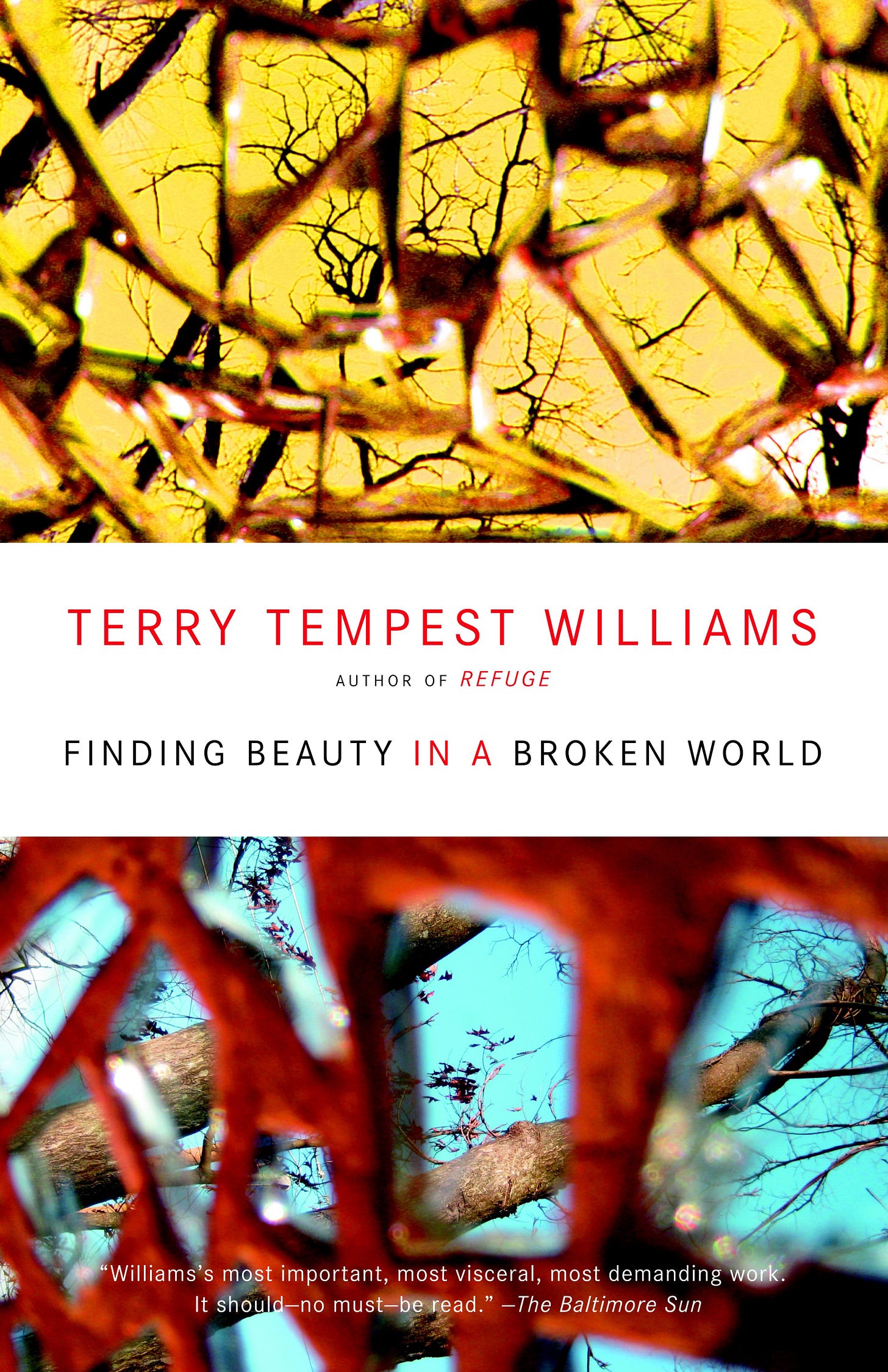
At one of my lowest and most lost times, I decided to walk. My reasoning was that when you are in the midst of a great darkness, all you can do is walk. Walk until you see a glimmer of light. Walk until you get to the other side.
And that's what I did. I walked the same path daily, but in my soul, I was moving thru the dark forest until I reached the open sky. I healed. I learned many valuable lessons. I regained my life.
I loved walking with you today and hearing the voices of your new home.
May it's peace surround you always, my friend.
Kathleen
Walking in wild lands,
whether weather warm or cool,
for the soul is food.
...
Talking with wildlings,
whether feeling bad or good,
elevates the mood.